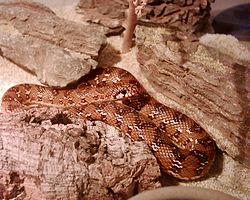| Pseudaspididae | |
|---|---|
 | |
| Pseudaspis cana | |
| Scientific classification | |
| Kingdom: | Animalia |
| Phylum: | Chordata |
| Class: | Reptilia |
| Order: | Squamata |
| Suborder: | Serpentes |
| Superfamily: | Elapoidea |
| Family: | Pseudaspididae Cope, 1893 |
| Genera | |
| |
Pseudaspididae is a small family of elapoid snakes, containing only two species (each in their own monotypic genus) from sub-Saharan Africa. They were formerly placed as a subfamily of the Lamprophiidae, but have been more recently identified as a distinct family. [1] However, some authors continue to place them as a subfamily of the Lamprophiidae. [2]
The Asian mock vipers in the genus Psammodynastes were previously placed as disjunct members of this family, but more recent studies support them being a significantly older lineage belonging to their own family, Psammodynastidae. [2] [3]